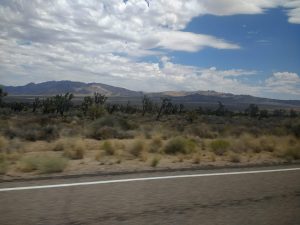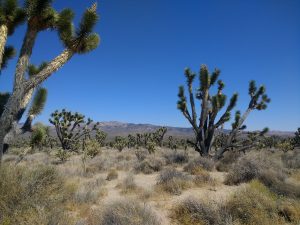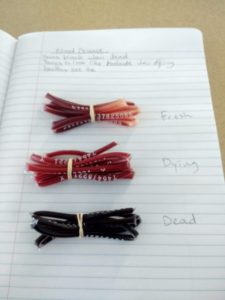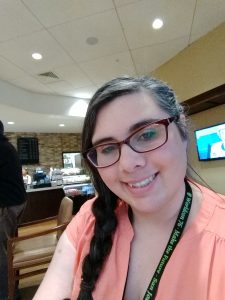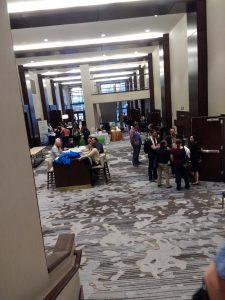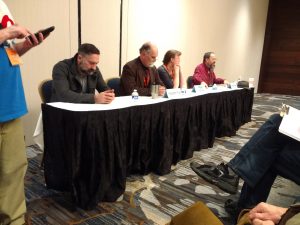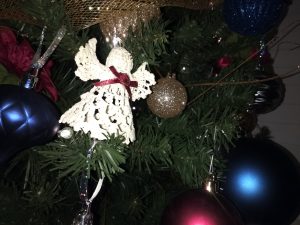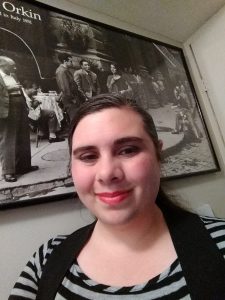Let’s talk about storytelling. After attending the 2020 Life the Universe and Everything conference held in Provo, UT, I really appreciate the vast experience that writers in this area have in a myriad of professional fields and what they contribute to the subjects they tackle in this conference’s panels. I really enjoyed a particular panel on bards, gleemen and storytellers which has had my mind turning over the subject for the last few days so instead of just giving you guys a tiny blurb about my general experiences at LTUE I want to delve a little deeper into this one subject. Depending on how much some of the other panel subjects itch at my brain I might come back and do more posts on some of the other panels, but for now let’s talk about storytelling.
I was really excited to go to this panel because I really like storytelling characters in books and it was even better when I saw that I knew some of the people who were going to be on the panel including M. Todd Gallowglas who has been a gleeman since he was seventeen and is intimately familiar with Irish-Gaelic storytelling tradition, Peter Orullian who studied at Julliard and is a musician, and Brandon Sanderson who does fantastic world building that includes storytellers and story telling characters. I was always happy to find out that one of the other panelists, Kristy S. Gilbert studied folklore extensively in college (I should mention that Brandon has also taken a lot of folklore classes).
The discussion focused mainly on the character of the storyteller and reasons why we as writers might want to include them in our stories, but as I was sitting there soaking up interesting facts about storyteller hierarchy in Irish-Gaelic storytelling tradition and the role that they play in specific societies I also thought about the mode of storytelling itself and ran through a bunch of questions that might or might not be helpful when you are trying to add an element of storytelling into your own work.
First of all, I ask the question of why – actually I ask it a couple of times.
Why am I telling this story in the first place?
To be fair the panel did cover this question. In world stories, songs and poems can work as a shorthand way to create the illusion of depth in your worldbuilding. If someone’s reciting a tale we can make some assumptions about the culture that produced the story. If it’s a tale from a long, long time ago we know that this is a group that has been around long enough to develop these stories and just the number of stories that a culture has can be telling too. For example the United States of America is a really new country and American folktales are not as prolific as more established peoples such as the French, Japanese, Egyptian, or Navajo. I’m not sure if I can name more than a few American folk heroes and most of them hail from 19th century ideals of cowboys, frontiers men and a huge lumberjack with a blue ox. This doesn’t mean Americans don’t tell stories because we definitely do but we don’t have a long history of telling them so the tales are more modern and are more likely to contain teens getting attacked in the woods on a camp out, or murderous hitchhikers in a more urban or at least suburban setting. Worlds we create, however, can be as old or young as we want them.
Stories also serve as a convenient way to info dump without, you know, being really boring… if you do it right. A story can tell a reader why the main character should avoid the woods without somebody just saying we don’t go into the woods because… Yeah that’s boring compared to a narrative tale of the same information.
There are more reasons to tell stories such as using a story to touch on the theme of your book, using it to purposely mislead characters, set-up an expectation that the hero will either have to uphold or forsake, etc. The main point is stories are used for many reasons and when using stories they should be serving multiple functions to help create a richer reading experience that pulls the reader through the plot. Brandon Sanderson does this very well in his Mistborn books using piece of text to start each chapter which is a slightly different way to approach storytelling and coincidentally the next questions I want to tackle.
Who’s telling the story?
This is where my thoughts and the panel started to split since the panel mostly talked about one category of storyteller, professionals which is fair since the name of the panel was Bards, Gleemen and Storytellers (not necessarily in that order), but the fact is we are all storytellers and the person relating a story doesn’t always have to be professional, they can be and if you want to do that that’s fine but they don’t have to be, nor do they necessarily have to be a grandmother or older village member who is wise and all knowing. In Roald Dahl’s book Matilda the Crunchem Hall Primary School students are the ones who tell new arrival Matilda stories of all of the horrible things The Trunchbull does to the kids under her care, but it’s not just kids in books that tell these kind of stories. I’m sure many of you can relate to the gossip that spreads around college departments about certain professors that one should avoid or the best class to get an easy passing grade (there’s an episode of the TV show Community that plays on this trope where one of the main characters takes a class to get an easy A and ends up having to work harder in it than any of his other classes).
Where is the story being told?
The next big element to setting up a storytelling is the setting. Who your storyteller is will help inform this, i.e. if the main character’s co-worker is telling the story there’s a good chance that they’re at work, a professional will probably be somehow separated from their audience either by standing on a stage, in the middle of a circle, standing in front of a seated crowd, etc. where they will most likely not be is knitting with the ladies in their craft circle, but that doesn’t mean they’ll never be there.
Setting is also informed by circumstances. Like I said before you’re probably not going to have a professional bard sitting in on the knitting circle, but you can bet stories are being told by the women as they knit. Kids talk as they play in the school yard, all kinds of work invites conversation and sometimes the work itself can be a way to naturally lead to relating a story (most of the stories my mom told be about her family happened when we were in the kitchen preparing meals together) and can be a good way to break up the storytelling as work is done.
How is the story being told?
Another consideration for storytelling in books is that stories take different forms that can be informed by setting and storyteller but again can be a reflection of a bigger element of the world building. In our world storytelling can be in the form of song, poems, and even dance and many groups of people have their own establish ways of telling stories. Here are few examples: in western retellings of fairytales it’s common to begin with the phrase “once upon a time”, many traditional dances are also a story from that culture’s folk tradition and the people from that culture can recognize what story is being told and what they’re supposed to take away from it, and in Greek and Latin epic poetry the lines follow a specific rhythmic pattern which is what makes it poetic. Does your character alone tell the story? Is it expected that the audience is going to call back like a chorus in a Greek tragedy? Are there multiple storytellers who take turns asking and answering questions? Is there music and who is playing it?
For me this is the fun part of in world story building because you get to set up the rules and then watch how your characters follow them or break them.
Last thoughts
I don’t know how many of you will make it this far into the article but if you do I hope that you find these musing helpful as you try to create your own storytelling cultures in your books and I just want to remind you that the most important thing to consider while you’re writing in world stories is that these stories should be doing more than one thing. I can’t wait to read more stories with great story tellers. I hope that you want that as well and to help you on your way here are a few books that have great in world storytelling.
Name of the Wind by Patrick Rothfuss
The Way of Kings by Brandon Sanderson
Mistborn the Final Empire by Brandon Sanderson
Harry Potter and the Deathly Hallows by J.K. Rowling
Matilda by Roahl Dahl
The Goose Girl by Shannon Hales
The Hunchback of Notre Dame by Victor Hugo
The Lord of the Rings by J.R.R. Tolkien
